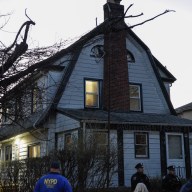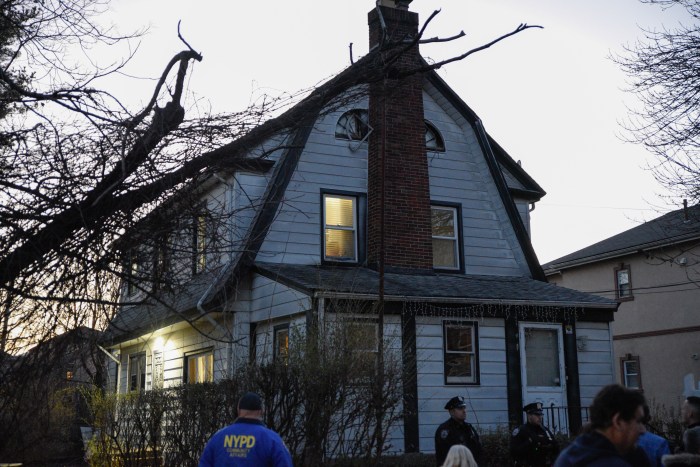The 1993 law, which was approved by voters in two referendums in 1993…
By Kathianne Boniello
Legislation co-sponsored by seven City Council members from Queens and signed by 22 of their counterparts from around the city challenging the term limits law moved forward this week.
The 1993 law, which was approved by voters in two referendums in 1993 and 1996, forces city council representatives to step down after two consecutive four-year terms. The entire Queens council delegation will be forced out in November’s election and several key committee chairmanships will be lost.
The 10 men and four women who now occupy Queens’ seats in the City Council share nearly 188 years of legislative experience, and seven of them have signed on to challenge the term limits law that requires them to leave office next year.
With the sweeping change that will eliminate 36 council members citywide from the 51-seat legislative body, Queens will also lose three powerful political positions belonging to Council Speaker Peter Vallone (D-Astoria), Comptroller and Forest Hills resident Alan Hevesi and longtime Borough President Claire Shulman.
City council members Helen Marshall (D-East Elmhurst), Julia Harrison (D-Flushing), Walter McCaffrey (D-Woodside), Alfonso Stabile (R-Ozone Park), Thomas White (D-Jamaica), John Sabini (D-Jackson Heights) and Juanita Watkins (D-Laurelton) have co-sponsored the bill challenging term limits, which is backed by 22 of their colleagues in the body.
Marshall, who is running for borough president in November, said she fears the term limit law was passed without enough forethought.
“The Council makes big decisions all the time,” she said, “but a whole lot of research goes into everything we do. Any time you’re going to make a change for a city it has to be based on careful academic evaluation.”
As the only borough in the city to lose all of its council members at once as well as the three major offices, Queens is facing a pivotal if not historical election year. The borough’s political clout in City Hall will diminish dramatically with the chairmanships of several key committees, the speakership and the comptroller’s slot likely to be taken out of Queens’ hands.
This week the Times-Ledger begins a yearlong effort to examine the ramifications of the 2001 elections as well as the role the city’s most diverse electorate will play in charting the borough's political future.
A number of factors could come into play throughout the year to shape Queens politics as seasoned civic activists, longtime political insiders and those new to the game get ready to step into the political limelight by running for elected office. At the same time, some long-serving elected officials from Queens who are not yet ready to retire will attempt to capture other government offices such as that of the borough president or mayor.
In a borough of nearly 2 million people hailing from nearly every part of the globe, the question becomes not only who will run in this year’s elections but who will vote for those candidates. As immigrant communities take their first steps toward making their mark on the borough’s political scene by fielding candidates and registering voters, the results of the 2000 Census could lead to redrawing of districts throughout Queens.
By far the most immediate and drastic impact of term limits on the borough will be the loss of its 14 city council representatives.
City Councilman Morton Povman (D-Forest Hills), the longest-serving council member who was first elected to office in 1971, is disturbed by the changes this year's elections will bring to Queens politics.
“Queens is going to lose quite a bit of clout in City Hall,” he said. “We are going to be affected more so than any other borough because we’ve had so much seniority there. To let all of that go all at one time is a very sad situation.”
Bernice Spitzer, a spokeswoman for Vallone, said term limits “impacts Queens the heaviest because the borough loses its entire delegation.”
In addition to losing the speakership of the City Council, Povman said, Queens will also forfeit authority on several important council committees, such as Rules, Public Safety and Aging.
The 1993 term-limit law passed by city voters restricts council members to two consecutive four-year terms, but allows for another eight years in office if candidates sit out a term. Of the 51 councilmen and women currently in office citywide, 36 will be forced out this November while another 11 will be required to leave in 2003.
The law also affects the city’s borough presidents, four out of five of whom must step down his year. Queens Borough President Claire Shulman, the first woman to be elected to the post in Queens who has held the office since 1986, said the city’s term limit law should have been phased in to avoid the loss of an entire borough delegation.
“It’s going to be tight,” Shulman said of the loss of so many Queens pols to term limits. “We lose and entire delegation. It should have been done differently. We’ll wind up with middle management making priority decisions.”
Even if Vallone, Hevesi or Ognibene won the race for mayor this year, the prospect of a Queens native running the city was not enough to lighten the gloom over the political future of the borough for many Queens officials facing term limits.
While Shulman said a Queens mayor “would be a plus,” she emphasized the next borough president must be able to protect the borough as other newly elected politicians learn the ropes.
“What I’m afraid of is that if you have newer people, Manhattan will run away with the resources,” she said. “We’ve done extremely well for quite a while in terms of funding and getting projects in the ground. I would hate to see a reversal of that.”
First elected in 1986, Flushing’s Harrison, who like Povman has no plans to run for office again after her term ends this year, painted a bleak vision of Queens politics after November.
“You’re running a government and you’re eliminating the entire leadership core of that government,” she said.
“You’re wiping out all the memory banks — make believe your computer crashed and there’s absolutely nothing left. I think it will be a very hurtful time for the borough.”
Harrison and Povman warned that it takes time to learn the ins and outs of any government system and new council members will be required to navigate a budget deal with the mayor's office without any institutional memory to rely on.
Povman also said the City Council’s reform of campaign finance laws, which now provide candidates with $4 to every $1 they raise, creates financial equality among potential candidates and gives them the opportunity to mount a challenge to even the most seasoned incumbent.
“You can term limit a person by voting them out,” he said. “Now it’s a different ballgame — we’ve leveled the playing field.”
In a predominantly Democratic borough, few Republicans have been able to achieve a foothold in Queens government. One of the GOP’s most powerful officials, state Sen. Frank Padavan (R-Bellerose), said it is unlikely Queens Republicans will increase their numbers in the City Council this fall.
“It’s always a possibility, but unfortunately the demographics makes it unlikely,” he said.
There are three Republican council members from Queens: Mike Abel of Bayside, Thomas Ognibene of Middle Village and Alfonso Stabile of Ozone Park.
Term limits could have both a positive and negative impact on Queens, Padavan said.
“In the short term the effect will be undesirable in terms of people’s experience, and losing the speakership, a lot of seniority and institutional knowledge about problems — obviously there’s going to be a gap,” he said.
“There are some people there who may not be as effective as a new council member,” Padavan said. He declined to be specific.
But Queens civic activist Corey Bearak, who works as an aide to Bronx Borough President Fernando Ferrer, a Democratic mayoral candidate, had a positive outlook on term limits.
“I don’t think Queens will be hurt because there is a lot of new energy out there and good people with good political philosophies,” he said. “Two or three candidates in each race are already in the political mix and they know what is going on in government.”
—Reporter Adam Kramer contributed to this story.
Reach reporter Kathianne Boniello by e-mail at Timesledgr@aol.com or call 229-0300, Ext. 146.
































